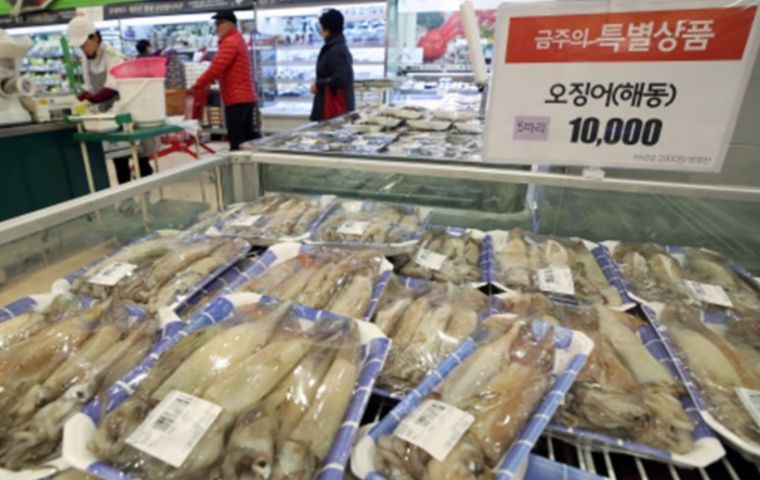MercoPress. South Atlantic News Agency
Squid is becoming “too expensive” in Korea because of lesser catch volumes
 Korea Agro-Fisheries & Food Trade Corporation and the Korea Agricultural Market Information System claim the price of a medium-sized frozen squid has increased 20.8% in twelve months
Korea Agro-Fisheries & Food Trade Corporation and the Korea Agricultural Market Information System claim the price of a medium-sized frozen squid has increased 20.8% in twelve months Korean media is pointing out the fact that squid, once considered the “people's side fish”, given its affordability, is now an expensive dish, and has offered some market prices in South Korean Won, which exchanges at 1,330 SKW to the US dollar.
According to the Korea Agro-Fisheries & Food Trade Corporation (aT) and the Korea Agricultural Market Information System (KAMIS), the price of a medium-sized frozen squid was 5,819 KRW as of January 25, a 20.8% increase compared to last year’s 4,816 KRW. Fresh chilled squid also saw a 6.8% rise to 7,441 KRW.
Dried squid, which is relatively easier to store, has also seen a price increase, although at a smaller scale. The retail price for ten pieces was 68,133 KRW on January 25, up 2.2% from 66,642 KRW last year.
Korean media then points out that allegedly the primary cause for the hike in prices can be attributed to “a significant reduction in global catch rates, exacerbated by climate change.
Squid, which typically have a one-year lifespan, struggle to adapt to rapidly changing habitats, leading to a scarcity in supply.
Despite steady demand for squid, efforts by the SK Ministry of Oceans and Fisheries to stabilize prices by indentifying alternative fishing grounds or releasing stockpiled supplies have not been successful in reducing the price surge, especially with the Lunar New Year round the corner.
Major production areas for squid, such as Korea’s East Sea, the Falkland Islands, and Russian waters, have all reported decreased catches due to rising sea temperatures.
According to fisheries data from Statistics Korea, squid catches have dramatically fallen from 154,000 tons in 2013 to 36,000 tons in recent years in coastal waters, a 76.7% decrease.
Media reports experts attribute these declines mainly to climate-induced changes in water temperature. Squid thrive in warmer waters of 14-18°C, but rapid temperature fluctuations are creating challenging survival conditions.
The East Sea, for example, has seen an average temperature rise from 15-16°C in the 1990s to 18-20°C in recent years.
The future outlook for squid prices remains grim, as both offshore and coastal catches continue to decrease. The National Institute of Fisheries Science reported that last year’s catch was 70-80% lower than the peak in 1996.
The consumer price for frozen squid has been steadily increasing since 2016, with a 122.7% rise from 6,918 KRW per kg in 2013 to 15,408 KRW in 2022.
The Ministry of Oceans and Fisheries is making efforts to reduce prices by releasing government stockpiled frozen squid, but it seems challenging to control the market price of squid in the short term due to the ”global scarcity.”




Top Comments
Disclaimer & comment rulesCommenting for this story is now closed.
If you have a Facebook account, become a fan and comment on our Facebook Page!